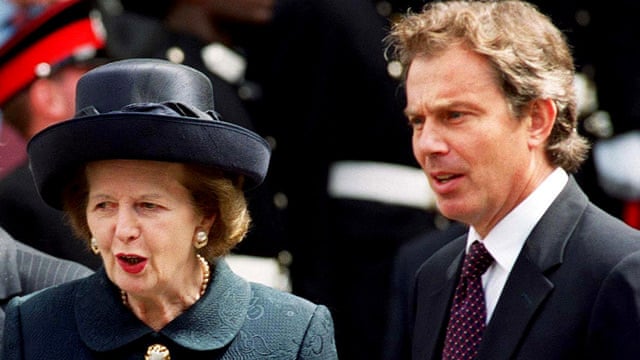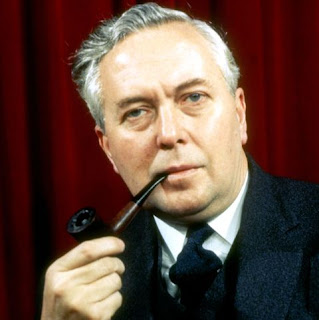We've just released a podcast episode ranking our favourite post-Thatcher Prime Ministers (here), but it's about time we looked at all the post-war Premiers.
We won't be ranking them this time, but giving you a brief bluffer's guide to each PM. We'll cover how they entered and exited office, what their main achievements/failures were, and how they governed. It's gonna be great.
However, it's also a big job, so we're breaking it down into three posts, covering three political eras:
1) 1945-1964: the welfare state is formed as Britain struggles with diminishing world influence.
2) 1964-1990: Labour are back, but the economy is tanking. Cue Thatcher.
3) 1990-2019: the centrists dominate, but struggle with Thatcher's legacy and global crises
This post starts in the ruins of the Second World War, and ends with the expulsion of a twelve-year Tory government, forming a highly significant period in British history.
The universal welfare state is formed, with the NHS created and key industries nationalised. Big government came to stay.
But as the country reinvented its domestic affairs it also struggled with a diminishing role on the world stage, as two hundred years of international dominance came to an end. This is the era where Britain transitioned from imperialist hegemon to progressive nation state - a legacy we're left with today.
 Weeks before the atomic bombs were dropped on Japan in August 1945, Churchill called a general election. The National Government that had run the country through six years of war was dissolved (more on that here.)
Weeks before the atomic bombs were dropped on Japan in August 1945, Churchill called a general election. The National Government that had run the country through six years of war was dissolved (more on that here.)And after a gruelling campaign, the Labour Party shocked the nation by winning for the first time since 1926. In a landslide too. And this government was like none before it.
Clement Attlee: 1945-1952 (Lab)
If you don't study politics, you might think Attlee rather boring and unnoticeable. If you do study politics you know Attlee was boring and unnoticeable.
Yet he spun those very traits into a sense of reliability and dedication, forging a wartime coalition, winning two elections and repairing Britain after humanity's worst crisis.
Yet he spun those very traits into a sense of reliability and dedication, forging a wartime coalition, winning two elections and repairing Britain after humanity's worst crisis.
Known for introducing the National Health Service - healthcare free at the point of delivery - Attlee's government also ushered in universal pensions and national insurance, ended the empire in India, nationalised a fifth of the economy (including the Bank of England), secretly developed Britain's first A-bomb, and demobilised 1.5 million troops across the globe.
His administration even played a role in developing the Marshall Plan - massive American loans to Europe for recovery.
All while recovering from a massive global conflict. In just his first two years, Attlee's administration spent more than any previous British government - ever. The workload nearly broke him.
His weak understanding of economics meant the economy remained chronically unstable; rationing was still in force seven years after war had ended. Yet he is today regarded as one of Britain's greatest post-war premiers, if not of all time.
His administration even played a role in developing the Marshall Plan - massive American loans to Europe for recovery.
All while recovering from a massive global conflict. In just his first two years, Attlee's administration spent more than any previous British government - ever. The workload nearly broke him.
His weak understanding of economics meant the economy remained chronically unstable; rationing was still in force seven years after war had ended. Yet he is today regarded as one of Britain's greatest post-war premiers, if not of all time.
Winston Churchill: 1952-1955 (Cons)
Churchill worked best as the figurehead of a balanced, rounded team - something he had done in wartime. But as an elder statesman doddering through a second term, his legacy is mixed. Having won the 1952 election, he wasn't quite sure what to do with it.
The second Churchill ministry was most prominent on international affairs. Desperate for a better Anglo-American relationship, Winston tried to create a US-Soviet detente. However, President Eisenhower remained evasive and the USSR distant.
Domestically, Churchill allowed his Cabinet to conduct the straightforward policies of building houses, ending rationing and balancing the economy. However there was a notable lack of vision, underpinned by the Prime Minister's age and deteriorating condition. After prolonged illness Churchill resigned in 1955.
Anthony Eden: 1955-1956 (Cons)
Anthony Eden was Churchill's protege and a highly capable Foreign Secretary. Chosen to lead after Churchill resigned, Eden subsequently won an election against the rudderless Labour party.
 Despite his obvious skill, however, Eden's ministry is overshadowed by an operation to covertly recapture the Suez Canal from the Egyptians.
Despite his obvious skill, however, Eden's ministry is overshadowed by an operation to covertly recapture the Suez Canal from the Egyptians.
The plan blew up in his face after the Americans (now becoming the world policeman) openly condemned the operation, along with most of the rest of the world.
Britain was humiliated and Eden, amidst claims of lying to the Commons, resigned. He was vastly overshadowed by his successor.
 Despite his obvious skill, however, Eden's ministry is overshadowed by an operation to covertly recapture the Suez Canal from the Egyptians.
Despite his obvious skill, however, Eden's ministry is overshadowed by an operation to covertly recapture the Suez Canal from the Egyptians. The plan blew up in his face after the Americans (now becoming the world policeman) openly condemned the operation, along with most of the rest of the world.
Britain was humiliated and Eden, amidst claims of lying to the Commons, resigned. He was vastly overshadowed by his successor.
Harold Macmillan: 1956-1963 (Cons)
So close, yet so far. Probably the standout Prime Minister of this era in his ingenuity, political scheming and 'grand designs', Harold Macmillan came fairly close to transforming the country. But he couldn't quite clinch it, despite election victory in 1959.
Famously declaring 'you've never had it so good' in a 1959 speech, 'Supermac' oversaw a bumpily growing economy that lowered unemployment and raised standards of living.
 However he faced the constant agony of maintaining the pound's value while trying to liberalise trade while trying to structurally transform the economy while trying to sustain high employment while trying to suppress inflation. It all culminated in 'stop-go' economics; inconsistent short-term fixes rather than medium-term plans.
However he faced the constant agony of maintaining the pound's value while trying to liberalise trade while trying to structurally transform the economy while trying to sustain high employment while trying to suppress inflation. It all culminated in 'stop-go' economics; inconsistent short-term fixes rather than medium-term plans.
In foreign policy, Prime Minister Macmillan had much more success albeit with one obvious failure. He upgraded the UK's nuclear deterrent to Polaris missiles, accelerated decolonisation, repaired the 'Special Relationship' after Suez and brokered a US-USSR test ban treaty.
However, he was unable to achieve the pivotal liberalising measure of joining the EEC - an early EU - thanks to a French veto. This was to haunt the economy. A brutal cabinet reshuffle in 1962 had already weakened his standing, but after de Gaulle's famous 'non', Macmillan ran out of road.
Looking for an exit, and accelerated by prominent scandals (including the Profumo Affair), in late 1963, under cover of a prostate illness, Macmillan essentially announced his resignation. Frenzy ensued, during which there is evidence that he 'managed' the process of selection to favour his Foreign Secretary, the 14th Earl of Home.
Famously declaring 'you've never had it so good' in a 1959 speech, 'Supermac' oversaw a bumpily growing economy that lowered unemployment and raised standards of living.
 However he faced the constant agony of maintaining the pound's value while trying to liberalise trade while trying to structurally transform the economy while trying to sustain high employment while trying to suppress inflation. It all culminated in 'stop-go' economics; inconsistent short-term fixes rather than medium-term plans.
However he faced the constant agony of maintaining the pound's value while trying to liberalise trade while trying to structurally transform the economy while trying to sustain high employment while trying to suppress inflation. It all culminated in 'stop-go' economics; inconsistent short-term fixes rather than medium-term plans.In foreign policy, Prime Minister Macmillan had much more success albeit with one obvious failure. He upgraded the UK's nuclear deterrent to Polaris missiles, accelerated decolonisation, repaired the 'Special Relationship' after Suez and brokered a US-USSR test ban treaty.
However, he was unable to achieve the pivotal liberalising measure of joining the EEC - an early EU - thanks to a French veto. This was to haunt the economy. A brutal cabinet reshuffle in 1962 had already weakened his standing, but after de Gaulle's famous 'non', Macmillan ran out of road.
Looking for an exit, and accelerated by prominent scandals (including the Profumo Affair), in late 1963, under cover of a prostate illness, Macmillan essentially announced his resignation. Frenzy ensued, during which there is evidence that he 'managed' the process of selection to favour his Foreign Secretary, the 14th Earl of Home.
Alec Douglas-Home: 1963-1964 (Cons)
 Put forward as a dark horse 'compromise candidate' during the chaos of Macmillan's resignation, Lord Home controversially formed a government in late 1963, the last Lord to do so (he quickly dropped the title and became an MP).
Put forward as a dark horse 'compromise candidate' during the chaos of Macmillan's resignation, Lord Home controversially formed a government in late 1963, the last Lord to do so (he quickly dropped the title and became an MP).However, with just a year until an election, Prime Minister Home was short on time and opportunities. He couldn't compare with the electrifying, power-hungry Harold Wilson in the Labour Party, and was severely undercut by dissent from his own party.
Wilson, a skilled speaker and TV performer, convinced the electorate of a need for change in the face of a tiring Conservative Party. Come the October election, Home was booted out of office for a Labour government.
Part 2 is here, or jump ahead to Part 3 here.
















